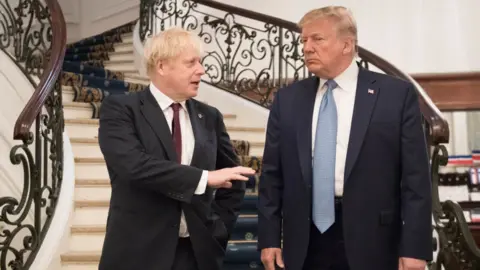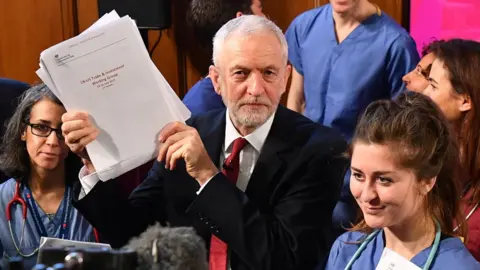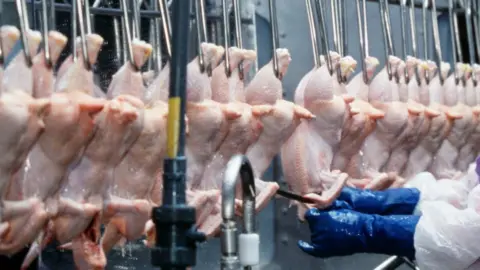General election 2019: UK-US trade deal - what do the leaked documents show?
 Getty Images
Getty ImagesLabour says leaked government documents show that the NHS would be at risk under a post-Brexit trade deal with the US.
However, Prime Minister Boris Johnson said the claim was "nonsense" and the NHS would not be part of formal talks.
The 451-page document, leaked from the Department for International Trade, contains a record of discussions that have taken place between UK and US officials over a possible future trade deal.
Here are five things we've learned from the document.
1. Drug pricing and patents
US trade negotiators had already set out that they wanted "full market access" for US drugs as part of a future UK/US trade deal after Brexit.
The leaked document does reiterate concern in the US over drug prices. One of the trade representatives is quoted as saying: "there is a lot of conversation on drug prices and looking at what other countries pay and this is causing angst".
A big part of the document, however, focuses on patents.
Pharmaceutical companies can obtain patents which grant exclusive rights to sell and market drugs for 20 years in their country of origin. While the patent exists, other companies cannot manufacture cheaper copies of the drug - often called generics - in the same country.
This applies in most countries around the world, but different countries have their own rules within that.
There are already a lot of similarities between the patent system in the US and the UK, including on the length of patents.
The leaked document compares the two systems in place for extending patents when they are delayed from entering the market.
The US negotiators also suggest some other technical changes to the UK's patent regime, which could affect the relationship with European patent regimes.
One of the main reasons for cheaper drug prices in the UK is the negotiating power of the NHS, as the near monopoly purchaser in the UK, whether the drugs are patented or generic.
 Getty Images
Getty Images2. Regulation
At the meeting on 10 July 2018, under the heading "key points to note", the document states: "The US are very concerned at the contents of the Chequers statement."
This refers to the first draft of Theresa May's proposed Brexit deal with the European Union (EU) earlier that month.
It proposed a "common rulebook" on goods with the EU.
The document reveals that the US trade representatives were left "deflated" at the UK's plan to stick close to EU rules on food safety and animal health.
They saw this as a "worst-case scenario" for a UK-US trade deal.
The Chequers agreement led to several ministerial resignations - including then Foreign Secretary Boris Johnson. His revised deal does not include any reference to a "common rulebook".
3. Food safety
In November 2017, the US told UK officials that it considered its food safety system to be "the gold standard", but acknowledged that its approach is different to the EU's.
For example, while the EU is trying to reduce the amount of chemicals in food, the US continues to use them, including chlorine, as "a final double check to remove any traces of pathogens" - ie disease-causing viruses or bacteria.
 Getty Images
Getty ImagesOne US official suggested that the UK should not stick with the EU's food regulatory standards after Brexit. Instead, the US "recommended that the UK maintains regulatory autonomy".
The same official suggested that the UK had used chemical washes to treat food in the past "and wondered if there would be an interest in bringing them back post-EU Exit".
The document says the US would "share their public lines on chlorine-washed chicken to help inform the media narrative around the issue".
4. Food labelling
In the document from the November 2017 meeting, the US talked about its concerns over some food labelling.
The US side said it was "concerned that labelling food with high sugar content (as has been done with tobacco) is not particularly useful in changing consumer behaviour".
This goes against the UK's current public health strategy, which includes raising awareness of food labels through campaigns like Change4Life in England and Wales and Eat Better Feel Better in Scotland.
In 2013, the UK government launched a voluntary front of pack labelling scheme, encouraging manufacturers to indicate the nutritional content of products, for example whether they are high in sugar or fat, using a traffic light scheme.
5. Climate change
The issue of climate change was raised at the meeting of the UK-US Trade and Investment Working Group, on 13-14 November 2017.
A UK representative "inquired about the possibility of including reference to climate change in a future UK-US trade agreement".
A US representative "responded emphatically that climate change is the most political (sensitive) question for the US, stating it is a 'lightning rod issue'".
They went on to explain that they were bound by Congress not to include mention of greenhouse gas emission reductions in trade agreements. They stated this ban would not be lifted anytime soon.
The UK has signed up to the Paris agreement on climate change and has set a target of net zero carbon emissions by 2050. The US, under President Trump, has said it intends to withdraw from the treaty.
The Department for International Trade said it would not comment on the leaked documents.



